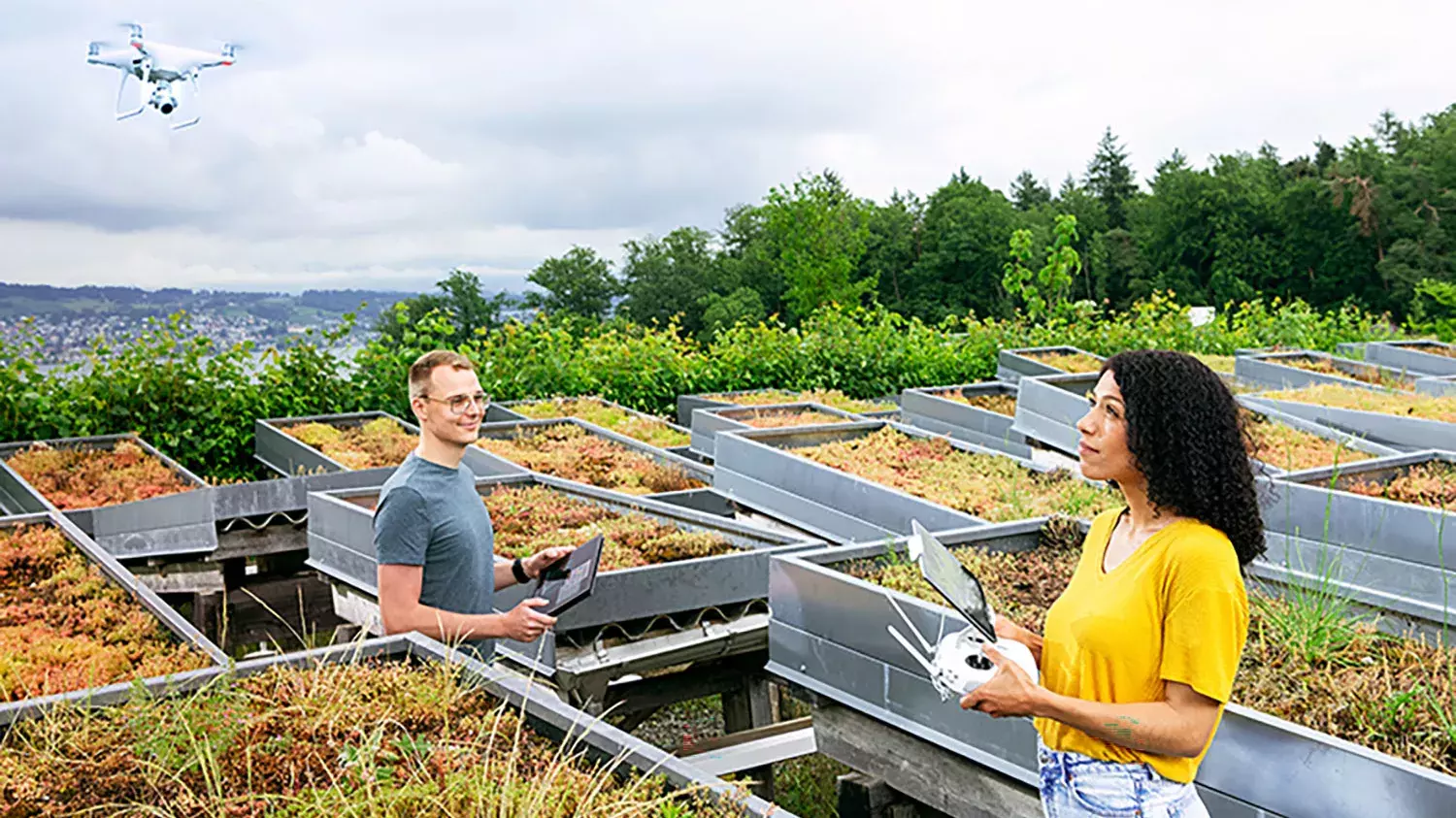Digital Environment Specialisation
In the environmental sector, we face significant challenges, from climate change and biodiversity loss to the energy transition. Big data and data science provide essential tools for addressing these global challenges. Learn to find data-driven solutions and make a personal contribution to environmental protection.
The "Digital Environment" specialisation makes you experts at the pioneering interface between Data Science and environmental sciences. Thanks to rapid technological advancements, the natural and built environment can be observed, measured, and digitally mapped with increasing granularity. This leads to increasingly detailed digital twins of our environment, which are invaluable in addressing major environmental challenges: from climate change and biodiversity loss to the energy transition. With your Data Science skills in the "Digital Environment" field, you contribute to harnessing the growing streams of environmental data for the development of sustainable solutions.
In addition to the core fundamentals of environmental sciences (ecology, geosciences, environmental technology), this specialisation teaches you how to collect and acquire environmental data, process and model it, and analyse and visualise it. Typical applications range from Geographic Information Systems (GIS) and Google Earth Engine to remote sensing drones. The skills in image processing, machine learning, and AI taught in this specialisation find applications far beyond the environmental sector.
This specialisation is offered in close collaboration with the Institute of Environment and Natural Resources (IUNR). You will have the opportunity to test your "Digital Environment" skills directly through ongoing research and development projects: from GIS-based site selection for agro-photovoltaic systems, to blockchain applications for greater transparency in supply chains, to AI-monitored well-being of farmed fish in indoor tanks.
You will learn...
- how to describe and monitor environmental systems.
- how to collect, process, and analyse geospatial data.
- the application of Geographic Information Systems (GIS), geodatabases, and geodata infrastructures in the cloud.
- the application of machine learning for image classification, remote sensing data (satellite and drone data), and other image data products.
- the processing of spatial and temporal (geo)data using scripting languages and programming (development and application of algorithms).
- how to build models that simulate complex environmental systems.
- the statistically sound handling of environmental and geospatial data, which are almost always self-correlated and contain uncertainties.
Examples of projects you could work on in the future
- In collaboration with the Federal Roads Office, you will develop a web map that visualises the risk of accidents with large wildlife for each road segment. The underlying risk model combines accident data from emergency services and hunting associations with geospatial data from Swisstopo and the Federal Office for the Environment.
- You will train machine learning algorithms to map the spread of the harmful neophyte "nutgrass" in drone images of cornfields. With this knowledge, farmers can more precisely apply herbicides, contributing to a reduction in the use of plant protection products.
- Nitrous oxide (N₂O) has a 300 times greater greenhouse effect than CO₂. You will identify N₂O emission sources from databases and simulate the gas's distribution using computer programs typically used for weather forecasting to analyse its impact on the climate.
- Many solar installations are on flat roofs where plants grow beside and under the panels. Manual mowing is very labour-intensive but necessary to prevent plants from shading the solar cells. You will adapt software initially developed in Wädenswil for plant identification apps to create an intelligent lawn mowing robot that selectively cuts only harmful plants, including those that negatively impact biodiversity. Additionally, you will set up a differential GPS system that allows the robot to navigate with centimetre accuracy.
Career
The career prospects with the specialisation in Digital Environment are as multifaceted as the challenges in the environmental sector. Graduates work in environmental and consulting firms, engineering and IT companies, for energy providers (PV, wind, geothermal), in the mobility sector (Mobility, SBB), for authorities (FOEN, DETEC), and, of course, for startups in the "Green Economy." Do you want to know where your career path might lead you after your studies? We offer a preview on our careers page.
The compulsory modules within the specialisation are supplemented by elective modules, which provide you with the opportunity to develop further, either in specific topics within the specialisation or supplementary topics. This enables you to create an individual course profile according to your interests.
It is possible to combine certain elective modules into a minor. A minor corresponds to at least 12 ECTS credits, of which about half is completed in the form of a project paper.
